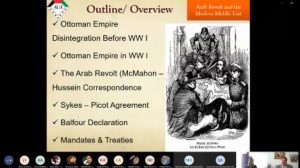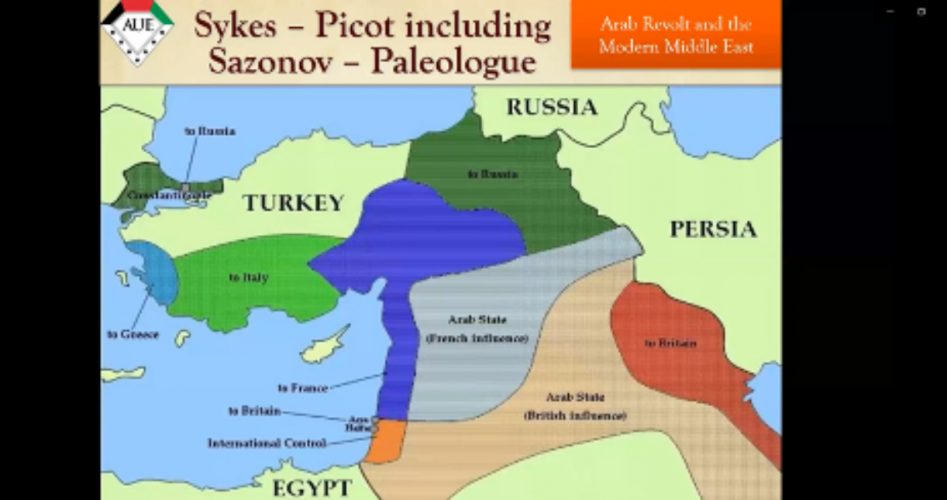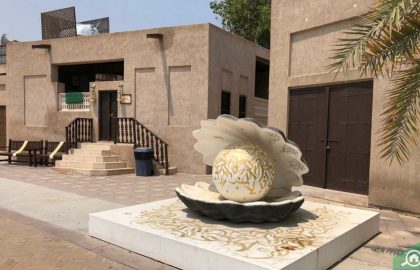The Middle East History Course with the guest speaker Kleanthis Kyriakidis
The Balfour and Sykes Picot Agreement: Its effects in the Middle East
Under the supervision of Faculty Ms. Karoline
Guest Speaker: Dr. Kleanthis Kyriakidis
Middle East History ASC 204-1/2

Topic: the Balfour and Sykes Picot Agreement: Its effects on the Middle East
Date and Time: October 11, 2020 and October 12,2020
Students’ Reports:
Saad Alsaadi
191420033
Guest speaker:
Dr. KK mainly discussed the Sykes-Picot agreement, the Arab revolt, and its consequences on the modern Middle East. KK argued that what defined the Middle East today was mainly because of the McMahon – Hussein correspondence, the Sykes-Picot agreement, and the Belfour declaration. He went into brief details about the causes of WWI which included colonial rivalry, arms race, militarism, nationalist movements, as well as socioeconomic problems. The immediate factor that led to WWI was the assassination of Archduke Franz Ferdinand, heir to the Austro-Hungarian throne in 1914 by Gavrilo Princip. Austria-Hungary declared war on Serbia, which led to Russian mobilization, which later led to Germany declaring war on Russia, which in turn led to France aided by Britain invading Belgium.
The ottoman empire, during WWI, sided with Bulgaria, Austria-Hungary, and Germany against pretty much the rest of the world. The Ottomans sided with these powers and recruited the power of Jihad against the Allies. The Allies were threatened by this move because they were in control of the Dardanelle straits which would cut off Russian trade routes and supply lines, the Germans were involved with British interests in India and in Iran, and that the allies were afraid that the Muslims would follow their Ottoman leaders and fight against them now that Jihad was declared. The ottomans had to deal with the allies from four fronts: Palestine and Syria, Iraq, Gallapoli, and the Caucasus. B
British colonialism of the Arab region was more about their control of the region’s economies and politics, mainly focusing on the foreign policies of these countries to protect the British’s best interests. In order to gain support of the Arabs to secure their win against the Ottomans, the British corresponded with the Grand Sherriff of Mecca, Sharif Hussein and in these correspondences they said that they would help the Arabs establish their own sovereign Arab states without any sort of intervention if they received their help defeating the ottoman empire. The British did not stand by their offer, which is evident by their secret signing of the Sykes-Picot agreement. The Sykes-Picot agreements was a secret agreement between Britain and France with the support of Russia; it was an agreement that would divide the control of the Arab world amongst them in case the Ottomans were defeated, and nations were divided in terms of both direct and indirect control. During these agreements, the British also corresponded with the Zionists because they needed them on their side for their financial and political support. The British foreign secretary Charles Balfour indirectly promised the Rothschild, a British-Jewish leader at the time that they would establish them a home in what was then the land of Palestine. This was again against the Sykes-Picot agreement, because Jerusalem was supposed to be an international zone that is not under the control of both Britain and France.
I believe that Dr. KK’s presentation was truly eye-opening because it focused on how the British, the French, and the Russians capitalized on a region by spreading propaganda and rallying support to liberate them, while at the same time having their own secret agreements to protect and further enhance their personal financial and political gains.
Reflection about Guest Speaker: Dr. Kleanthis Kyriakidis Bothaina Oudaa – 161410050
To begin, it was a great lesson with our guest speaker Dr. KK who introduced it to a topic that we all know about or heard a bit at least, but he presented it from a different angle with different important details that I was not aware of and many of my colleagues. First, we were introduced to the Ottoman disintegration before WW1, and how we have the curving of nowadays ME which impacted the borders and mentality of those affected areas. He clearly mentioned that many people thought that all ME was under the Ottoman Empire, and that is not true because part of North Africa, Balkans, and big part of the Gulf was not under their control. Next, we spoke about WW1 “the Great War” and how it is a big event in history that was caused by many reasons that will be discussed in my colleague’s reflection. However, the Ottoman Empire in WW1 decided to side with Central Power against the 3 big allies who were British, French, and Russian. It fought in four fronts against these allies.
We also discussed the promises that were made to Arabs by the British, and the Zionists contribution in Balfour Declaration which is a divergent of Sykes-Picot (promising the Jews a home in the ME) and how Israel was created after WW2 not one. The British used the word “national home” not country in the declaration which was dated on November 7,1917 which was vaguer than Sykes-Picot as described by Dr. KK.
Finally, the Central Power lost the war, and Russia withdrew from WW1 because of its inner revolution. We have the Americans intervening which changed the balance of the war, and we got introduced to Mandates which are territories that the British claimed they are not there to “colonize” but “help” which is a direct lie from my opinion and I believe many as well!
Reflection about Guest Speaker: Dr. Kleanthis Kyriakidis
Mohammad Omar – 181410069
In continuation with my colleague Bothaina, our guest speaker Dr. KK gave us a clear vision of the Ottoman Empire role in ME before and after WW1, as well as the revolutions of ME Arab countries. We discussed in depth many agreements and treaties including Sykes Picot, Belfour Declaration, Lausanne Treaty, and the Treaty of Severs. Interestingly, the WW1 (1914-1918) was caused by various reasons including colonial rivalry (for example entire Africa was colonized and everyone wanted a share of the “big pie”), militarism, very complex alliances, and nationalist movements like the Arab nationalist movement which was fueled by the British as Dr. KK explained. In addition, Imperialism was an important cause as well, but the main cause which triggered the whole war was the assassination of Archduke Franz Ferdinand in Balkans as Dr. KK mentioned. Also, the Sykes-picot divided League of Nations mandates which included Syria, Lebanon, Iraq, Transjordan, and many other Arab countries.
Finally, Treaty of Severes apart of Sykes-Picot was signed by Ottoman Sultan, and a big area of the Ottoman colonization was taken from them by the Greeks, Italians, and of course British & French. So truly there was an intervention of many countries to take the goods and resources of these Arab countries within Middle East, and they shaped the way it is divided recently!








